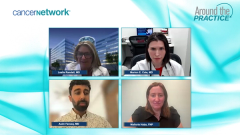
From Challenges to Solutions: Ensuring Timely and Effective Molecular Testing in Ovarian Cancer
Panelists discuss how overcoming barriers to molecular testing in ovarian cancer requires addressing logistical challenges like tissue availability and external pathology coordination, managing financial constraints through institutional support and low-cost options, and enhancing patient communication by clearly explaining how testing creates a personalized treatment roadmap that empowers patients to pursue tailored therapies based on their tumor's genetic and molecular profile.
Episodes in this series

Overcoming Barriers to Molecular Testing
Accessing molecular testing in ovarian cancer care can be complicated by logistical and financial barriers. Challenges arise depending on whether pathology is performed in-house or externally and on the availability of sufficient tissue for testing. Financial constraints, especially among uninsured patients, also play a significant role, requiring institutional support and low-cost testing options.
Effective patient communication is key when introducing molecular testing. Patients are often receptive when the rationale is clearly explained—particularly that results inform both immediate and future treatment planning. Presenting testing as a roadmap for personalized care increases patient engagement and trust.
The trend toward individualized oncology has fostered strong interest among patients to understand their tumor biology. Comprehensive NGS testing is viewed as empowering, allowing patients to avoid one-size-fits-all regimens and instead pursue therapies tailored to their genetic and molecular profile.
Newsletter
Stay up to date on recent advances in the multidisciplinary approach to cancer.



































